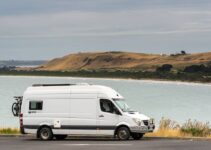Buying a campervan and ready to start van life? We will help you understand everything to look for and ask before you buy a van!
Buying a campervan isn’t easy, especially in this day and age. It’s a seller’s market, and this process is comparable to buying a car and a house at the exact same time since the van is likely to be both for you.
When it comes to choosing the best van for van life, there are a ridiculous amount of variables, nuts and bolts and you’ve got to be confident before you take your dream campervan off the lot.
First, you have to decide if you’re looking for the best van to convert into a campervan, or just the best overall campervan already set up for the road. There’s a big difference – in price, and what to look for – between an empty cargo van and a van ready for the road.
Then you have to think about the amount of time you plan to live in your van. Whether you’re shopping for a full-time home on wheels, seasonal nomadic lifestyles or a weekend campervan conversion, your campervan will be your car, your campsite, and your home.
Any slight complications in your house are put on blast when they’re hitting highway speeds. And before you can get to that perfect campsite in the heart of the woods, you’ve got to trust in your engine to get you there and back again.
It’s way too easy to fall in love with a perfect interior only to spend your first weekend in the woods calling AAA over a mechanical issue. Or maybe you have a van that runs perfectly well, but you don’t know where to begin building it out.
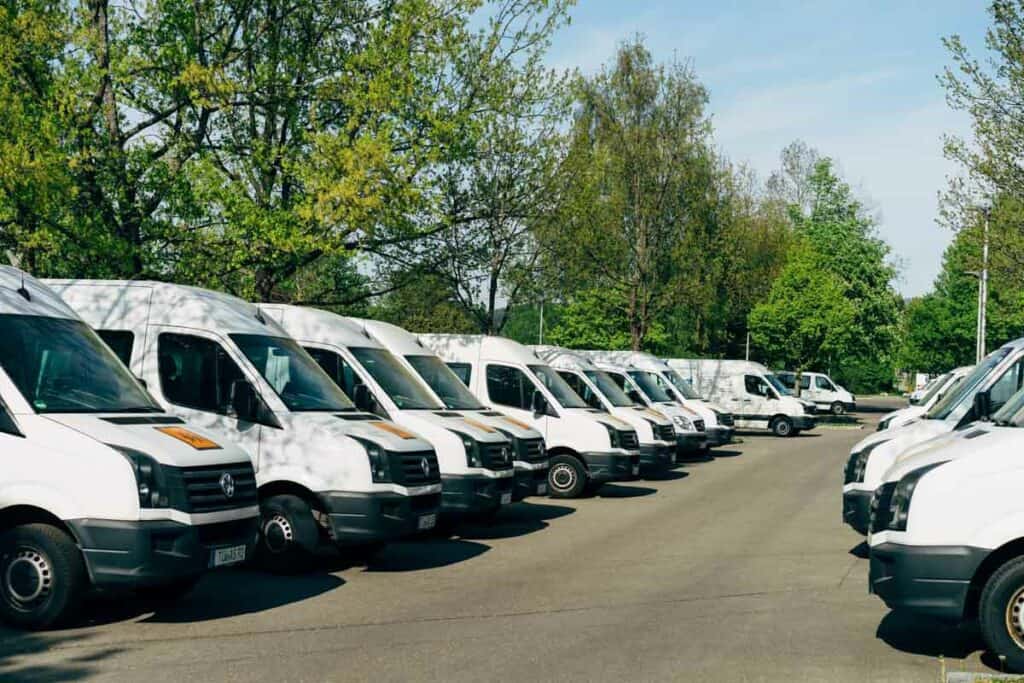
Don’t start off your van life on the wrong foot by rushing through your shopping experience.
This ultimate buying guide is a great way to start your search. We’ve compiled years of experience making pretty much every mistake in the book so you don’t have to.
All the questions we wish we had asked, all the mechanical issues we’ve seen and all the afternoons spent on the side of the road have led to this guidebook full of everything you should consider and ask when shopping for your dream home.
Spending a bit of extra time and money now will save you loads of both in the long run. So follow along and let this guide steer you toward your perfect van.
Base Cost | Fuel Type | Roof Height | Wheelbase | Conversion Length | |
Mercedes Sprinter | $41,000+ | Diesel | 76.7" - 79.1" | 144" - 170" | 132" - 189" |
Ford Transit | $36,000+ | Gasoline | 56.9" - 81.5" | 130" - 148" | 115" - 162" |
Dodge Ram Promaster | $34,000+ | Gasoline | 66.3" - 77.1" | 118" - 159" | 106" - 160" |
Nissan NV | $30,000+ | Gasoline | 55.8" - 76.9" | 146.1" | 120" |
Chevy Express | $33,000+ | Gasoline | 52.9" - 53.4" | 135" - 155" | 126" - 173" |
Ford E-Series | Varies (only used models) | Gasoline | 53.9" - 54.2" | 138" | 121" - 142" |
Frequently Asked Questions About Buying a Campervan
To get started in your quest for buying the ultimate camper van for your van life we’ll address some of the bigger questions to ask yourself to help narrow down the make and model that interests you the most.
From there, you can hone in on shopping specific vans until you find, and buy, the one that is right for you.
What Roof Height?
Your roof height will largely define your living space. Weekenders and stealth campers can get away with low-roofed classic vans. But anyone looking to transition to a full-time van camper should leave a little room for more.
Living in a camper van doesn’t have to mean cramming yourself into as small a space as possible.
Low-roof vans will be cheaper, fit in more places, get better gas mileage, and still… We wouldn’t think twice about a van we couldn’t stand up inside.
Campers shopping for a budget RV for weekend trips can save loads of money with a low-top conversion van, but everyone else should make room to stretch out inside.
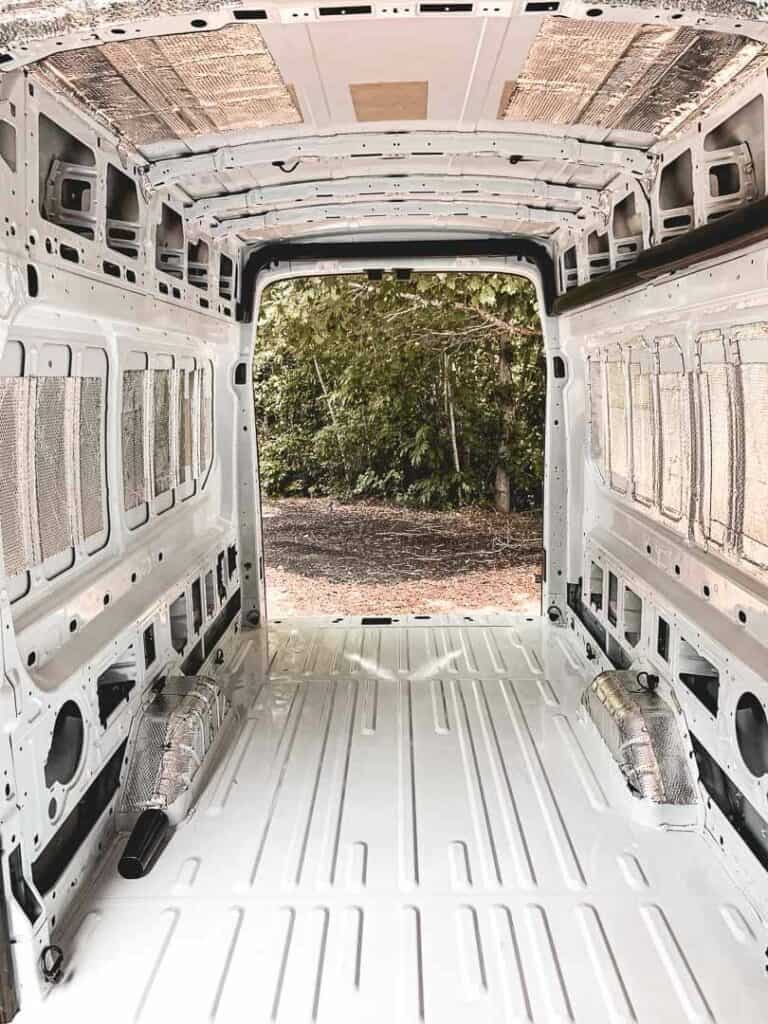
What Wheelbase Length?
In a vacuum and in your campervan, bigger is almost always better. Most popular camper van models come in a wide range of wheelbases between 130″ and 170″.
This number represents the space between your vehicle’s front and rear axles, which typically determines your interior space. The longer the wheelbase, the more room you will have to build out the inside.
Forty inches may not seem like a huge deal, but it is generally the difference between finding space for a composting toilet and shower or relying on rest stops. Go big or find yourself digging a hole in the woods.
Gasoline or Diesel?
In a perfect world, diesel is the most sensible fuel type. Unfortunately, it’s not always up to you. Especially for shoppers in North America, diesel engines aren’t always easy to come by. And if you do happen to find one, it won’t come cheap.
That’s okay. A bit of extra cash upfront will turn into a good investment in the long term, as a diesel engine brings you the best value long term. These engines can last for hundreds of thousands of miles longer than a gasoline engine at a slightly increased fuel economy.
That doesn’t mean that gasoline engines are worthless. Many camper vans, including the Ford Transit and Ram Promaster, have used gasoline engines to power their way to the top of the market.
But the diesel-powered sprinter van is the king of the market largely thanks to the fuel type. This is your best bet for a diesel-powered van and the only major type of cargo or passenger van in the US that runs on diesel.
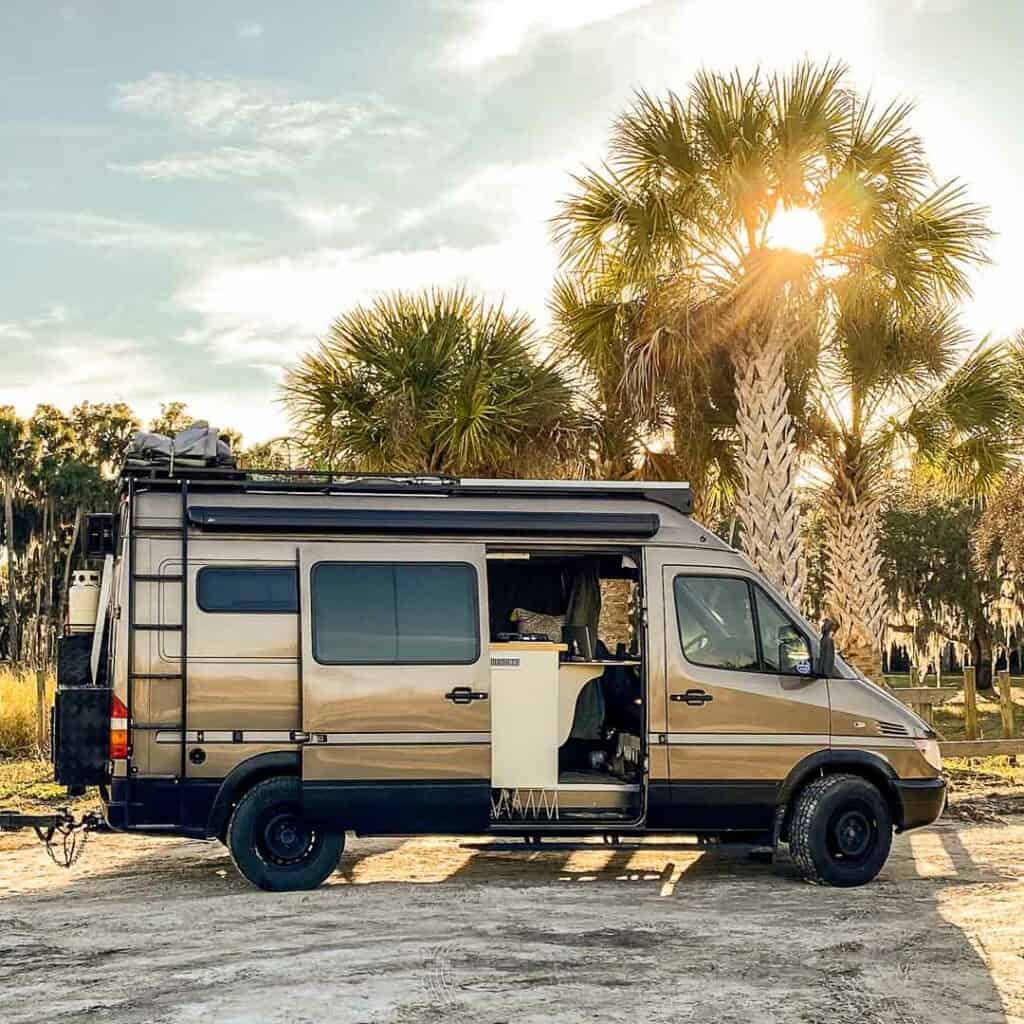
2WD or 4WD?
Where do you want to take your camper van? RV parks and paved surfaces or Forest Service Roads and Burea of Land Management land?
Not only will four-wheel drive add on tens of thousands of dollars to your investment, but it will also slightly lower your fuel economy. Be realistic about your expectations. Most van dwellers drive 2WD vans and get along fine. Are you really going to put yourself in situations to use the 4WD? Or do you have it just for insurance?
And do be aware that a two-wheel drive camper van will severely limit your reach into the lesser-explored areas.
This lifestyle is more accessible than ever. But most of the best roads are still unpaved and unmaintained. Free campsites in the United States are getting hard to come by, and chances are you’ll have to navigate some tricky terrain to get there.
Anyone using their rig for mountain biking or looking to hit the best boondocking the country has to offer should invest in a 4X4 van camper.
But if you don’t expect to find much time off the asphalt, they aren’t worth the extra money.
Convert or Already Built?

This depends on two things: Your budget and your carpentry skills (or desire to learn!). Here’s the twist. It would be best if you considered your budget second and your technical skill first.
If you are looking to start exploring in the next month or cannot do most of the van conversion work yourself, you would be better off going with campervans that are ready to hit the road.
Van conversions can take months, even if you had full days to commit to working on them. But especially if you have to consult YouTube and ask questions at the hardware store before you get started on any projects.
With the influx of motorhomes and other RVs out on the road, RV maintenance specialists are backed up across the country. While a cheap convert may seem like a great deal, you need to be aware of precisely what you’re getting yourself into before you try to flip a used vehicle into a dream van.
A happy medium is to buy a camper that has seen some better days. You can likely find an already livable vehicle for cheap and learn how to fix it on the go.
Or plan out a partial or full remodel once you’ve lived in the van long enough to know what you like and do like about the space and come up with a plan for how to change it.
New or Used Campervan?
There is no cut-and-dry answer to this question. It will likely all come down to your available finances, repair skills, your feelings about whether “newer is better” and your local campervan market.
Buying a used campervan is a great way to maximize your budget. Even base vehicles new class B RVs will require a significant investment. And you can often find a used van with features far beyond what you could afford in a new model.
Therefore, we highly recommend shopping for a used RV. But it brings a whole new set of challenges. Wear and tear will eventually add up and all that money you saved in your initial investment could go towards constant repairs.
If you feel comfortable inspecting a used van and know exactly what to look for and what questions to ask then used is your best bet to make your dollar stretch.
But if you have the money to spend and you like the idea of breaking in your van and knowing everything that’s happened to it since it rolled off the manufacturer’s floor, go ahead and buy new.
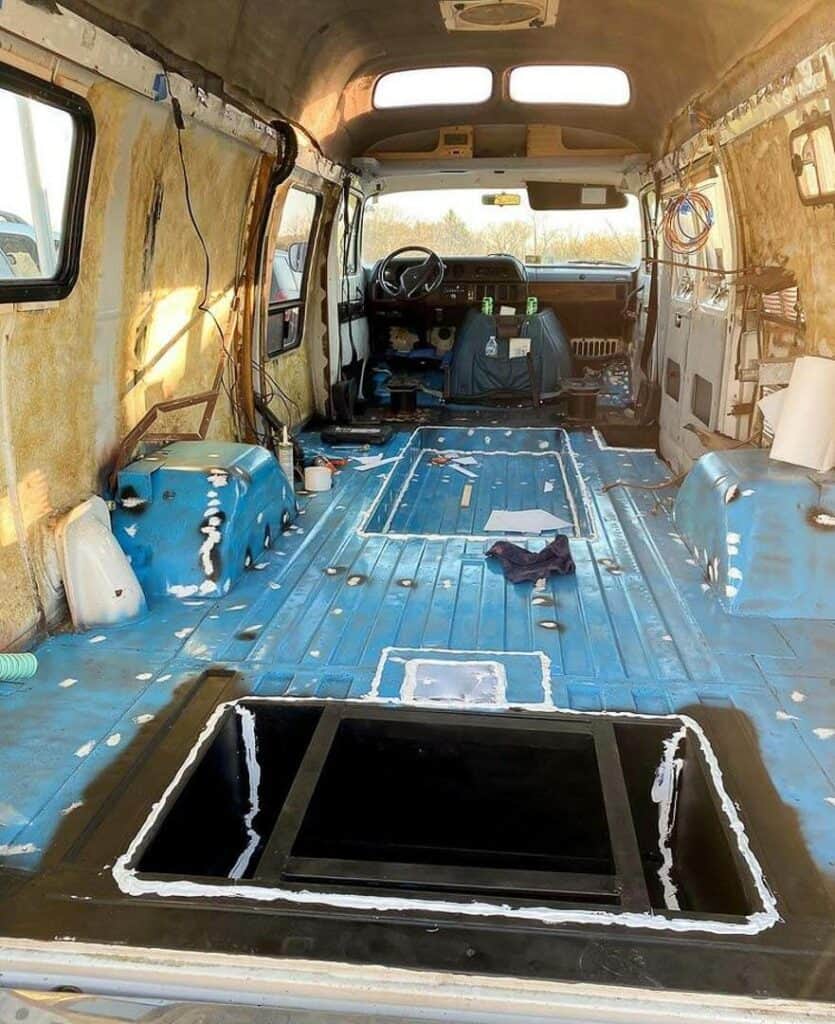
What adventures do I seek?
Finding a van to fit into a shipping container to ship around the Darien Gap between Panama and Colombia is one thing. Building one out to fit two full-time working professionals is another.
If you know that you have specific wants or needs when it comes to adventure on the road, then one camper van may make sense over another one.
For example, if you are looking to drive the Pan Am and you want to fit into a shipping container to avoid the roll-on roll-off option then your options are limited. But if you don’t mind the roll-on roll-off experience then you can get back to searching by other criteria.
Or if you want the largest possible living space so you can have an office, a bed you don’t have to fold up every day and a proper bathroom then you’ll be looking into different options.
Where to Look for Campervans?
Once you know your personal answers to those frequently asked questions, you can start looking for the best van for your lifestyle.
Here are a few of the best websites for starting your search. Remember to set your filters to exactly what you are looking for to help reduce the playing field.
And we suggest that you be as specific as possible if you know exactly which type of van you want. Be patient and search for the one you really want instead of settling on one you can quickly buy.
Looking to get it done the old-fashioned way? In addition to showrooms full of the latest new campervan options, local dealerships will sometimes stock used campervan options or offer a discount on new vehicles that have been sitting on the lot for a while.
Note that with any non-dealer relationship, you enter with a potential seller, you will want to verify all the details of the sale in great detail.
Be clear on what qualifies as “as is” or conditional repairs before the sale. And don’t turn over any cash to reserve or hold the van for sale as this is one of the more common scams in online marketplaces.
What To look for in an Inspection
So, you’ve found an excellent campervan for sale and now it’s time to take a look in person. This step in the process is where you’ll fall in love with your future home but keep a level head throughout the process.
Before You Take the Trip
No matter where you found your used campervan or new listing, you should give the seller a call and talk through a few details to make sure you don’t waste your time driving out there.
These are the critical pieces of information you should ask for:
- Why are they selling the van?
- Where did they take the van while they owned it?
- Does the seller have the service and/or accident history?
- Did it (or does it currently) have any particular issues that needed to be addressed?
- Ask for the VIN number
- Look up the Blue Book Value and accident history
- Schedule a mechanical inspection
All of this information should not be a controversial request, especially the inspection. If a seller balks at providing you any of the information above, or they seem to not know the answers or can’t answer any of the questions then it’s likely you should take a pass on that van.
Anyone who refuses to provide the VIN or allows you to take the van for an inspection is a good sign there is some trouble under the hood.
Here’s what you should do with that VIN: take a look at where the campervan has most of its life.
Any van, truck or Class B motorhomes that have spent time in cold areas, especially the northern parts of the east coast, will likely have some rust damage caused by the salts used to clear the roads from snow.
A low-mileage campervan from the northeast may be closer to catastrophe than a higher-mileage unit that spent its life in Texas.
During your walkthrough
Rust damage
You won’t find many classic vans without any rust damage. But make sure your campervan of choice isn’t on the cusp of being overrun by rust.
A splash of rust around the edges is part of the fun of buying a used van. But any rust near the wheels or engine area, or rust anywhere besides the van’s body, should cancel a sale.
Any honest seller should give you a picture of rust spots before you set foot in the vehicle. But be sure to crawl beneath the van and take a look around for rust.
Uneven tire tread
You can replace worn-down tires and negotiate this with the seller. So worn-down tires aren’t a dealbreaker.
But a camper with uneven tires is a sign of more significant work needed. Often it’s as simple as needing a tire rotation or a rotary replaced.
But checking every tire to see where it is mainly worn down is a great way to get an idea of the repairs needed.
Try every appliance – and make sure the campervan is NOT plugged into the wall while you’re doing so!
Any RV electrical system looks formidable when it’s connected to shore power. The most significant test of a campervan’s prowess comes while boondocking.
Ideally, you’d have a few days to test out your potential used campervan to get an idea of how long the battery system lasts. But that’s a bit too much to ask.
Just be sure to fire everything up and have the owner walk you through how to turn on every appliance, from the water pump to the propane heater, so you don’t find out the hard way if something’s not working.
A broken appliance or two isn’t a dealbreaker. But it should be factored into the cost. And if you find out your seller is lying about one thing, chances are they’re lying about something else too.
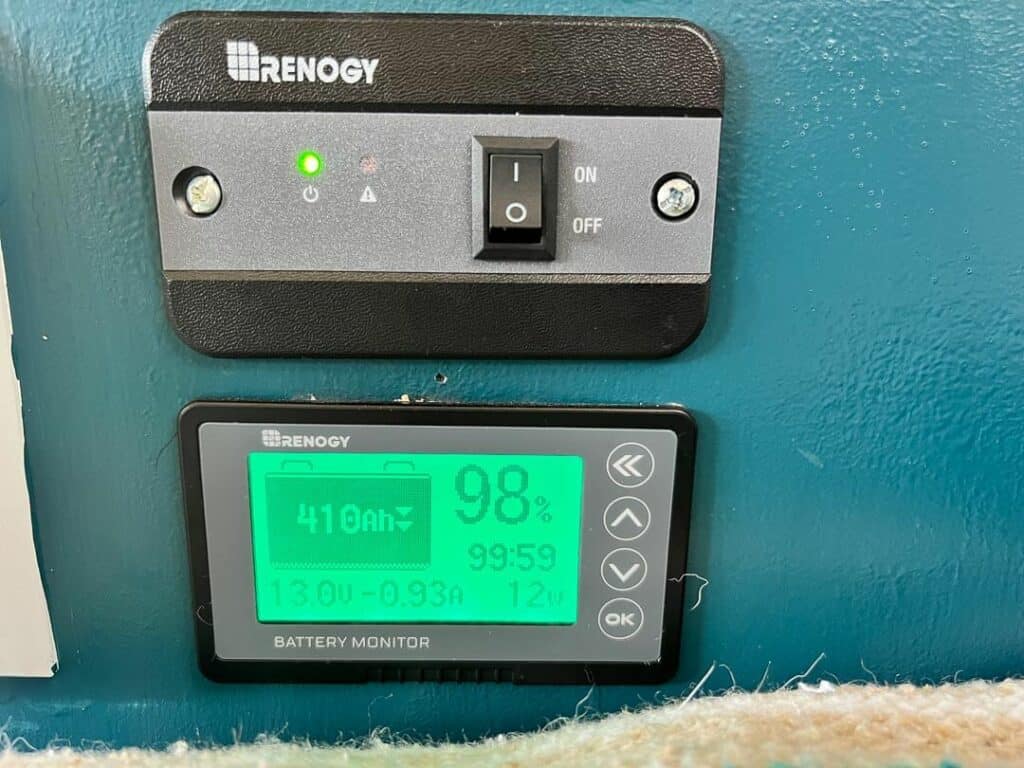
Check for water damage and book a rainy day
Once the walls or roof of your vehicle have some water damage, there is no going back. Leaks are nearly impossible to seal fully, and there is no such thing as a low-cost roof repair.
The only way to be sure your campervan has no water damage is to check it out during a downpour. But you won’t be able to control the weather. You can take your test drive through the car wash as a close alternative.
Any water damage or a noticeable leak should be an immediate dealbreaker – unless stopping the leak and repairing any damage to the framing or structure of the campervan is in your wheelhouse and you can negotiate the price down a substantial amount.
Pop the Top
Pop-top campervans are an ingenious way to make the most out of limited space. However, these complicated pieces of machinery are not known to stand the test of time. So make sure your sleeping space is in working order before you hand any cash over.
While on your Test Drive
Take it on the highway. Most campervans feel fine at a low speed. But take things up a notch to see where your van stands.
Classic vans are bound to bring a bit of shake at highway speeds. But if your potential campervan struggles to hit 65 on a flat surface, it’s not worth the trouble.
Slam on the brakes
Hopefully, it’s the only time you’ll have to stop on a dime. But you want to be sure you can trust your safety features in a controlled environment before you take it out into traffic with everything and everyone you love stowed away inside.
Quickly accelerate on an uncrowded street and hit the brakes fast to feel for the ABS and see how well the van responds.
Transmission Issues
Chances are the first major thing you’ll have to replace in an old campervan will be the engine, the transmission, and/or the brakes. Listen closely to the transmission as you accelerate. Any jerking motions or a delayed gear shift is a good sign that trouble is around the corner.
Check the transmission fluid as well. It should be bright red and have a mechanical smell to it. If not, it may be worth having professionally inspected as transmission repairs are pricey.
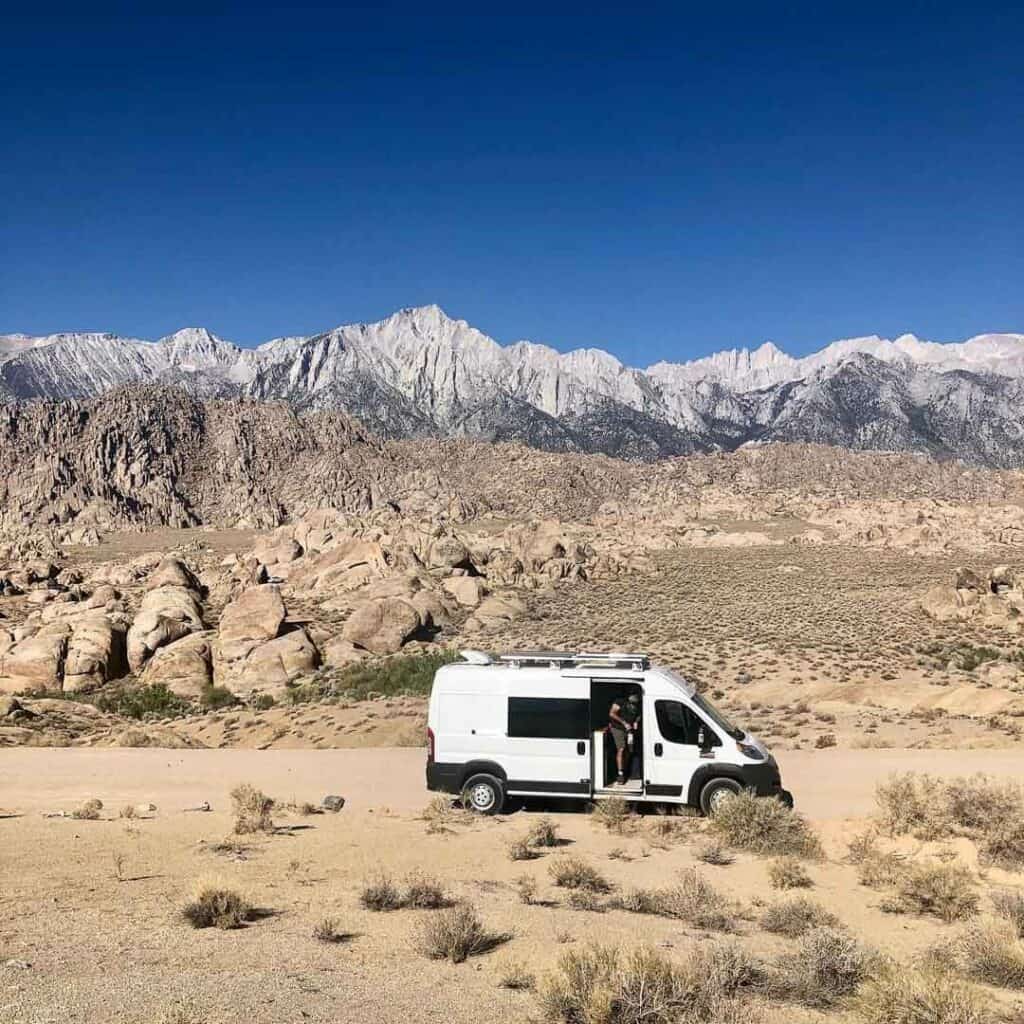
Seek Professional advice
Unless you are a certified mechanic, a quick trip to a shop will give you more info on what’s going on underneath the hood. Modern shops have all sorts of tools to get a great reading of a van’s engine, drivetrain, brakes, and steering. You can use this advice to leverage your offer and provide much-needed peace of mind when making your purchase.
As we said earlier, anyone who wants to sell you a campervan without an inspection is hiding something significant.
Our favorite question to ask the mechanic: Would you drive this across the country?
That’s all there is to it!
The most important thing to remember when buying a campervan is to trust your gut. It’s hard to explain the feeling you’ll get the first time you step into the campervan of your dreams. But when you know, you’ll know.
Don’t try to force a sale you’re unsure about just to get the job done. And don’t forget to stand up for yourself and clearly articulate your demands to any potential seller. The perfect van is out there for you somewhere. So be patient, but diligent, and find it!
This post may contain affiliate links. That means if you make a purchase a product we recommend using the links in this article, we may receive a small commission at no extra cost to you. We promise to use this pocket money to buy lots of coffee and fuel for the campervan to keep us enjoying #VanLife for just a little longer. We appreciate your support, and only recommend products we know and trust. Thank you friends!


